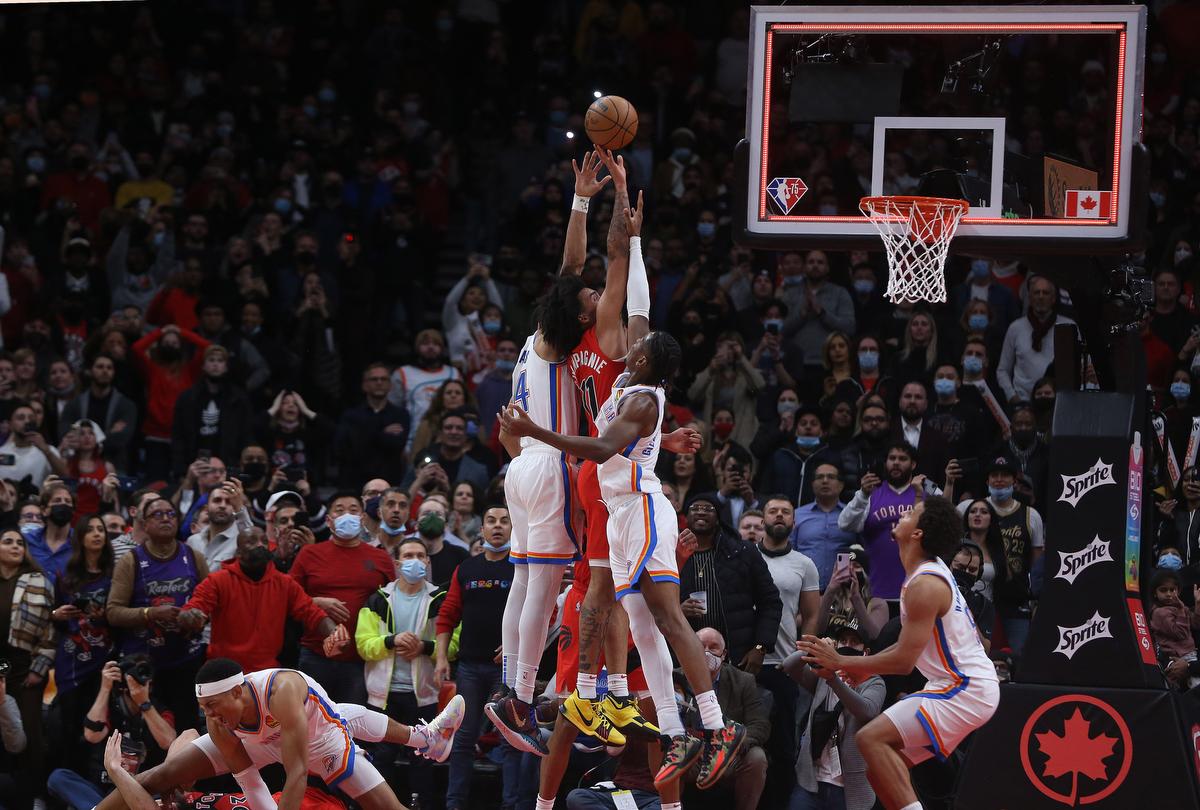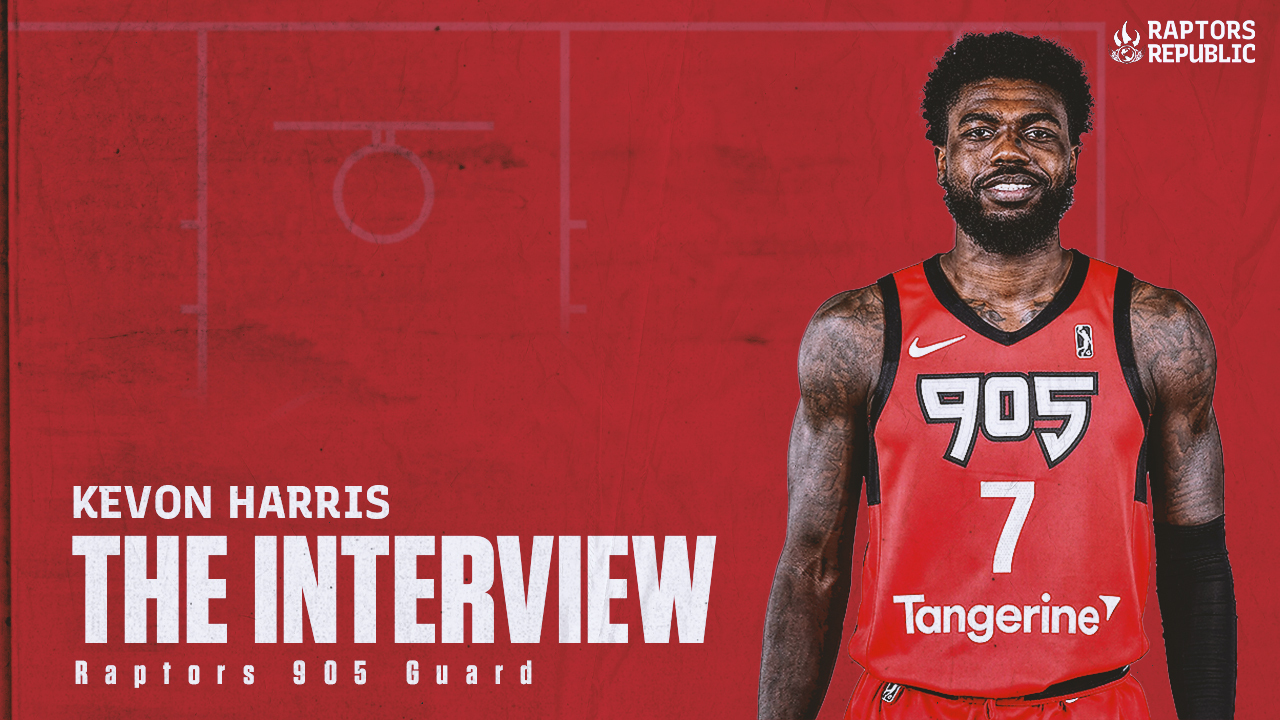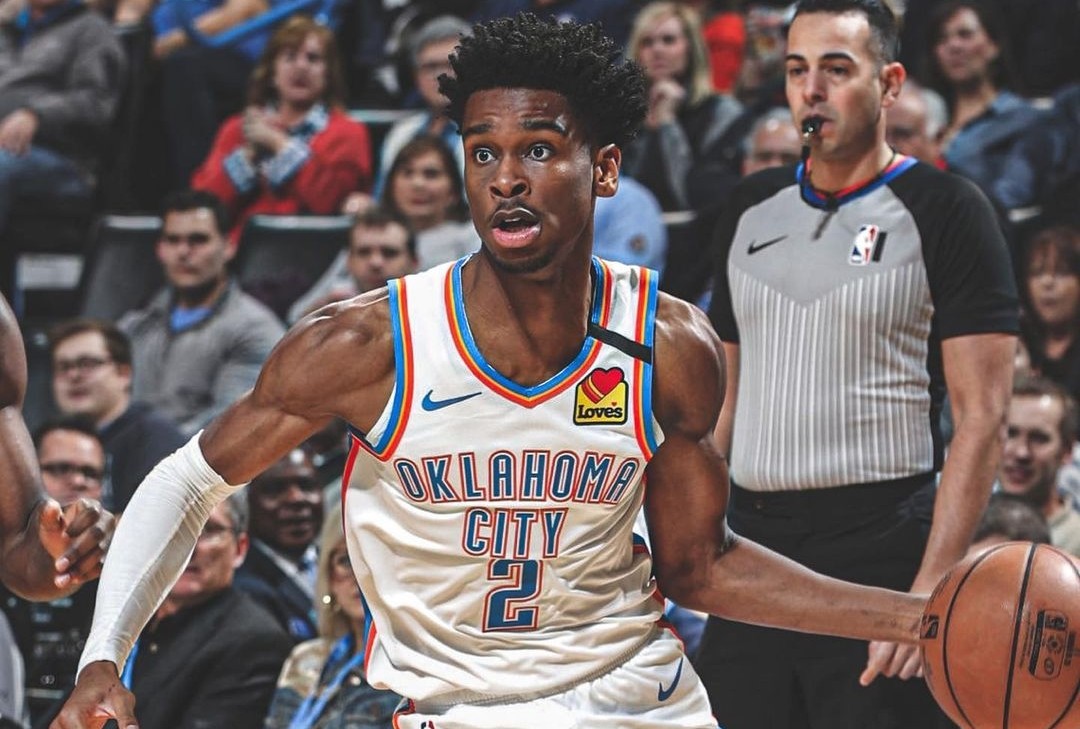It’s not every day that you get to win a game twice, only to end up losing.
Justin Champagnie did just that. In his first real, extended stretch in an NBA game, the undrafted two-way player played the entire fourth quarter for the Toronto Raptors. He was chosen really by default:
“I didn’t like any of the other guys,” said Nick Nurse after the game of his choice to play Champagnie. “I thought the other guys were soft, and unenergetic and not playing their role. They’re suppose to come off the bench and provide energy, and they weren’t getting any stops, weren’t getting any rebounds, were fumbling balls around, so I went to Justin.”
But regardless of how he earned the role, Champagnie was — as he said no fewer than 10 times during his podium appearance after the game — ready. He defended Shai Gilgeous-Alexander for most of the quarter, trusting his focus and intensity would compensate for the star’s superior quickness and skill. And it worked! Toronto won the quarter by 10 after a humiliating third quarter. That wasn’t even the height of Champagnie’s performance.
With under a minute left in the game and the game tied, he cut to the rim, and Fred VanVleet threw a pass far behind him. An unready player might have let the ball slip behind him, hoping to win it in overtime. But Champagnie reached back, seeming to reverse his momentum, only to burst to the rim after gathering the ball, sticky-fingered. Then he jumped, hung, flipping his arms behind him, looping them around, towards the net, vision blotted out by all the bodies between him and the prize. Meanwhile, above the fray, the ball nuzzled against the glass, dropped gently through the mesh.
It should have been a game winner, but Toronto threw the farm at Gilgeous-Alexander in the paint on the next possession, even tossing in the reserves as Gilgeous-Alexander sat in the paint, pump-faking, thinking. By the time he reversed course and pivoted outside for a pass, Mike Muscala didn’t have a defender within a mile, and he calmly drilled the ensuing triple.
Toronto had nine seconds left, down a single point. It ran a VanVleet-Pascal Siakam pick and roll, but it resulted in little, and VanVleet’s wild shot was blocked. But Champagnie found himself underneath the ball, in a pile of arms and bad intentions, but he rose higher than the swarm, changing the direction of the ball with barely a touch. Once again the ball dripped gently through the cylinder, this time without even the help of the glass. The refs called it ‘good,’ as Champagnie immediately found himself in another swarm, this time arms and good intentions, his teammates hugging and piling and cheering his heroics. He won the game a second time.
But then on review the basket didn’t count, ruled a tenth of a second too late.
“It kind of hurt,” he said after the game when I asked him what that felt like, still smiling at the memory of his first real, true shot at NBA minutes, his incredible play, his near-miracle. “It really did hurt. Especially the last one. I thought I had it.”
It’s unfortunate for Champagnie that he can’t celebrate what is thus far the highlight of his NBA career with a win. But despite his tip-in at the buzzer not counting, the loss was far from his fault.
The entire team was lackadaisical, taking the Oklahoma City Thunder far too lightly, treating them as a team that in VanVleet’s self-critical words “we must think we’re better than.” The defense was passive, letting the Thunder’s shooters rain fire from deep, connecting on 17 of 40 triples, good for 42.5 percent for those without a calculator handy. The effort was even worse.
“It seems to be our pattern: play well, play really bad, get yelled at, play really hard, do it all over again,” said VanVleet.
In that case, the Raptors are obviously due for another yelling. Nurse’s and VanVleet’s post-game pressers were terse, far briefer than usual. They knew Toronto shouldn’t have lost this game. And it shouldn’t take yelling and motivation for Toronto’s play to improve.
VanVleet himself was partially to blame, as he had trouble finding his individual offense with Lu Dort hounding his every step. Of course, VanVleet’s offense was critical in Toronto climbing back into the game, as he hit his usual bounty of clutch triples. And he passed extremely well all game. But he found his points uncharacteristically difficult to come by, especially inside the arc, where he shot 1 for 7, only earning four free throws for his efforts.
The bench was similarly loose. It performed fairly well in the first half, when Oklahoma City’s energy matched Toronto’s, but it wasn’t enough in the second. Svi Mykhailiuk committed three fouls in seven minutes of gametime, missing all three shots he attempted. Dalano Banton was glacial, failing to push the pace or create any advantages with the ball. Isaac Bonga couldn’t lift his lineup.
Of course, Bonga shouldn’t be asked to lift his lineup. Chris Boucher started at center because Khem Birch and Precious Achiuwa were both out in this one with injury. It’s tough to win basketball games without a center available. Toronto is in deep right now in the injury game, and Nurse says that Birch and OG Anunoby might be out for the foreseeable future, with no updates on their statuses. For Achiuwa, the best news Nurse could offer us before the game was that he “[hopes] it’s short term.”
Toronto can perhaps survive one plague, either poor health or poor effort, but it certainly cannot survive both. Champagnie had his champagne moment ruined. As long as the cycle of ‘good play, poor play, yelling, repeat’ is combined with a full injured list, Toronto is in for a long season. It’ll take a whole team effort, far more than Champagnie’s highlight performance, to avert that.




